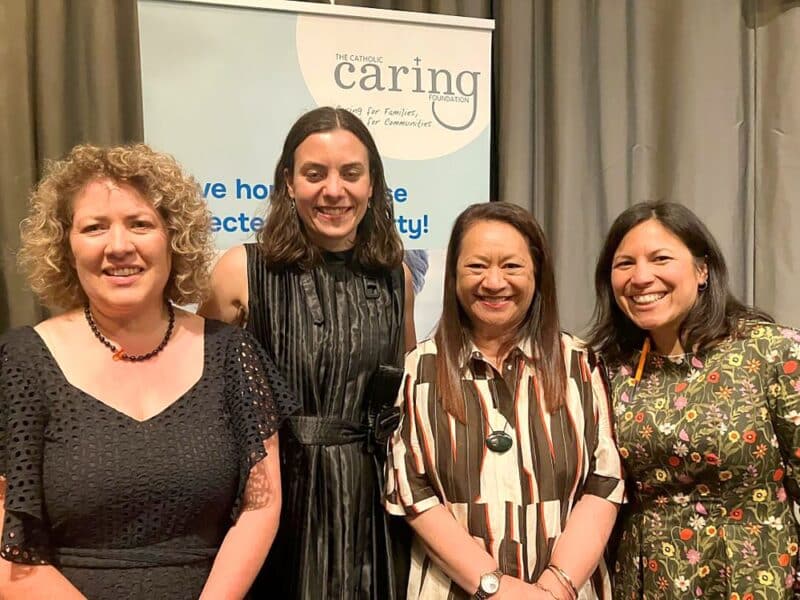ImpactLab CEO Maria English called on social enterprise investors and philanthropic funders to “find those who don’t give up, and support them so they can love without getting tired”.
Ms English, daughter of former Prime Minister Sir William English, spoke at a November 27 dinner at the Northern Club organised by the Auckland Catholic Caring Foundation.
Ms English said her organisation, ImpactLab, measures the outcomes of different charities or non-governmental organisations using a framework called “social return on investment”.
“We think about the pathway in somebody’s life. They have a past. There’s a story of how they got to where they got to. At some point, they come into contact with an organisation . . . charities or front-line teams who, at that moment in time, had the opportunity to shift in a positive direction the future pathway of that person or that family’s life.
“Unfortunately, from the data, we often know all too well what the pathway would look like without support. But that charity or NGO has the opportunity to shift that in a more positive direction. And the difference between the pathway with support and without support is what we call social value,” she explained.
She said that the pathway without support could mean continued abuse, violence, police call-outs, and stress on the court and prison systems.
Data
She said the data gathered by her organisation is important for four reasons.
“The first is, data can help shift the focus away from administrative overhead and shift the conversation from one about cost to one about value,” Ms English said.
She said that charities are frequently under pressure from donors not to put funds towards support for the staff or for adequate technology systems.
“In my experience, that kind of incremental improvement is radically undervalued, but I think it holds the secret to supporting our frontline teams and organisations to be adaptive, and best meet the needs of the families who really need their effective support,” she said.
She said that data also “helps to counteract potential biases towards charities that have flash marketing”.
She said some charities are better at telling their stories than others, but data can tell another story.
Ms English said that data can also “make inequity specific enough to be addressed”.
She talked about a team of Catholic doctors in Rotorua who were trying to engage whanau who were totally disengaged from primary health care. Some families took five visits, others 20 visits and others 35 visits, in order to get engaged.
“The point here is that our investment needs to look different based on who it is that we’re working with. And data can give us a picture of that,” she said.
Lastly, she said, data helps to shift thinking from “outputs to outcomes”.
“This is a catchphrase you might have heard before: an output being the thing that gets done, the outcome being the change that happens in someone’s life as a result of it,” she said.
She cited a government-funded disability organisation that helps look for jobs for the disabled.
“The programme funds them on outputs: how many people did you get into jobs? But what they were interested in was outcomes: are these jobs that our people actually want to do, and are they able to stay in those jobs for the long-term,” she said.
Effective investment
To those wanting to effectively invest in organisations which help people in hardship, Ms English said that there are four characteristics to look out for: trusting relationships, autonomy, holistic focus with flexibility, and attentiveness to family context.
She said that, without trusting relationships, there can be no engagement.
Second, organisations should enable their clients to have autonomy. She cited the Wellington City Mission’s social supermarkets scheme that “respects people’s autonomy, even in a situation of need to exercise choice and dignity”.
She said that highly effective programmes are also less about the models that they are implementing, and are more “about being flexible and responsive to the priorities of the family”.
Finally, she said attentiveness to family context is really important.
“Consistently, we see, in most effective programmes, people exist in an ecosystem of relationships, and they work to strengthen that rather than to detract from it,” she said.
Ms English said that, at the end of any programme of support, there needs to be enough relationships and support around the person or family to continue on their journey.
Ms English related the story of a youth worker she once met who was looking for a job for a person he [youth worker] was supporting. After looking for a job for several months, they finally found one.
The youth worker was so relieved, but also thought, “what if I had given up yesterday?”
This is what funding should be all about, Ms English said.
“It is about funding that extra day. It’s about funding the next family. It’s about funding the next piece of the puzzle of the training of the staff so they can work a bit more effectively with the person that they are serving.”

Reader Interactions